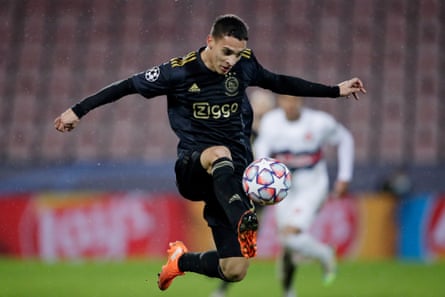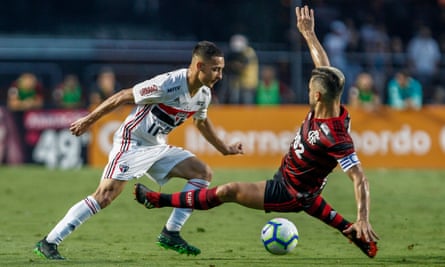Never underestimate a young man in love with running after a ball. Buying boots was not within the budget of Antony’s family but they found a way. “My mother worked at a clothes and shoes shop close to our house,” he says. “The boots I used were borrowed through her, somewhat in secret. But I only borrowed them because I didn’t have the means to buy any.”
Antony grew up the youngest of three children in Osasco, the industrial suburb in São Paulo that also produced Ederson and Rodrgyo. His dad was a locksmith in the humble neighbourhood Jardim Veloso, where life was not easy. “Coming from the favela has its disadvantages, but also good points. The hard side is that you’re always exposed to bad stuff – drugs, guns, and so on. The nice side is that within the community, there’s this humility. No one sees themselves as bigger or more important than the others.
“What I experienced there was seeing things that hurt people: families losing their sons, husbands, wives. I suffered when the police invaded my home to see if there was anything there. I lived in the middle of the favela, close to where drugs were sold almost in front of our house. These are things you see and it shocks you. But I always had strength from my family, a family very devoted to God, who always showed me the right path to follow.”
Antony joined at São Paulo FC when he was 12. Three years later he moved to their Cotia training centre and, in 2018, he realised the dream of most young Brazilians: he became a professional footballer. Following a quick stint in the first-team squad, he went back to the Under-20s where he won the Copinha, the most prominent youth tournament in Brazil. He had wondered whether going back to the youth team would hold him back, but it propelled him to new heights. Not only did São Paulo win the trophy, but he was voted the player of the tournament with four goals and six assists in nine games.
Antony returned to the first team, but the fans were demanding of the teenager. “We become professionals knowing how to deal with criticism,” he says. “There are people who applaud you, while others boo. People curse and people compliment. I had to deal with it for a while, but I was always focused, working, knowing I was giving it my all daily. And things take a turn, like they did with me. They were picking on me, but then they cheered me on.”
A lot of São Paulo fans miss Antony these days. In February this year, the forward joined Ajax for £18m. He still watches his former club and is ecstatic in his praise of their coach, Fernando Diniz, who developed, promoted and backed youth players even against early criticism from fans.
“He’s a man who lifts you up when you make a mistake,” says Antony of Diniz. “He makes you feel comfortable. That’s what he did with me. His first game was against Flamengo. I remember he called me over and put me at ease by saying: ‘Whenever you get the ball, I want you to push forward every chance you get. It doesn’t matter if you make a mistake.’ That’s how players like Brenner and Gabriel Sara have been flourishing. That’s Diniz for you. We know he’s a psychology graduate; we know how smart he is. He makes you feel at ease and raises you up despite the boos, despite the cursing from the crowd. He’s always there for you, cheering his players on. Diniz is, without a doubt, one of the best coaches I’ve ever worked with.”

When Antony arrived in the Netherlands, he had to cope with a new language and climate. There were also changed on the pitch. “The tactical side was the hardest part. The game was faster, more dynamic, smarter. In the beginning I had to alter my positioning, pressing and some other things. I struggled a bit,” he says. The numbers would suggest otherwise. He scored five goals and set up two more in his first 680 minutes on the field, including a goal in the 2-1 win against Midtjylland in the Champions League.
It took him some time to get his head around the idea that he was now competing in the Champions League. “Man, it took a while. When I signed with Ajax, it was early in the morning. I called my brother and we talked about closing the deal. Right there I already envisioned myself playing in the Champions League. Making my dream, my family’s dream, come true. Last year I was watching it, now I’m playing in it and I’m scoring. It gives me butterflies in my stomach and I was very emotional coming into the game. Only God and my family know how much I had to endure and how hard I needed to work to reach this moment.”
Now, in the biggest club competition in the world, he is facing the club world champions at Anfield. “It’s a very important match. We know how great Liverpool are, but we’re also aware of our own qualities and we play to win. We have to play at the level we’ve been performing at recently. We can’t change our pattern, because it’s been working. When we have the ball, we need to maintain our intensity and, without it, keep the pressure on too. If we play smart and cautious, I believe it can work. We always dream about playing in the Champions League and I feel very fulfilled. Especially when playing against players like Alisson, Roberto Firmino, Fabinho and the others. It’s an honour.”

Antony lives with his wife Rosilenne and their one-year-old son Lorenzo in Amsterdam. “It’s scary, right,” he says. “Nineteen years old is such a young age to become a parent. It’s impossible not to worry. How will I take care of him? How will I teach him if I’m so young? These questions left me desperate but, today, having him by my side is everything to me. Instead of being Antony the boy, I’m a man, a dad, someone who wants to set an example for his son. Before doing anything, I think about him. Lorenzo is everything to me. And everything I do will be for him. When he came into this world, it was the happiest moment of my life.”
Antony is full of responsibilities, but also aspirations. He was in the Brazil team that won the Toulon Cup last year and was hoping to represent his country at the Olympics in Tokyo this summer. “I want to be in that group, pursuing and winning titles,” he says. A good performance at the Games next year may even help him reach the senior Brazil team? “I believe everything has to be done patiently. I keep working in the Under-23 squad and at Ajax. I believe people are watching, but the decision is theirs. I can only keep playing my role every day. Reaching the senior squad is the dream of every player, but these things come naturally in their own time, so I’m not worried about it. I’ll keep working as hard as I can.”
Given his speed, incision and ability to lose markers easily, Antony is one of the most promising players to have emerged in Brazil in a while. Being a prospect brings with it pressure. How does he handle it? “This comes from when we all still lived in the favela. My family taught me: ‘It doesn’t matter where you are, always stay humble.’ I’m sure I’m only here because I was able to keep my feet on the ground. That’s why I get along great with every other player. It’s the humility that brought me here. Being a big name or a promising prospect doesn’t matter.”
What advice would he give the young Antony a decade ago? “When I was that age, I suffered a lot in the favela. It was close to the time when my parents got divorced. I was still a boy and it was the hardest moment of my life - especially because we didn’t have another room, so I slept in the same bedroom as them. I miss that. If I could go back in time, I would ask myself to have patience, because everything happens in God’s time. Back then I was really hopeless. But today I would ask for patience, since tomorrow belongs only to God. Today you may be going through this, yet tomorrow might be a better day – as it was for me. I went through all of that and today I’m living the dream I had as a kid.
“My goals are to become a champion, to make history, grow as a footballer, and to be an example on and off the pitch,” he says, before adding with a smile: “And maybe, in the future, who knows, enter the race to be crowned the best in the world.”

Comments (…)
Sign in or create your Guardian account to join the discussion